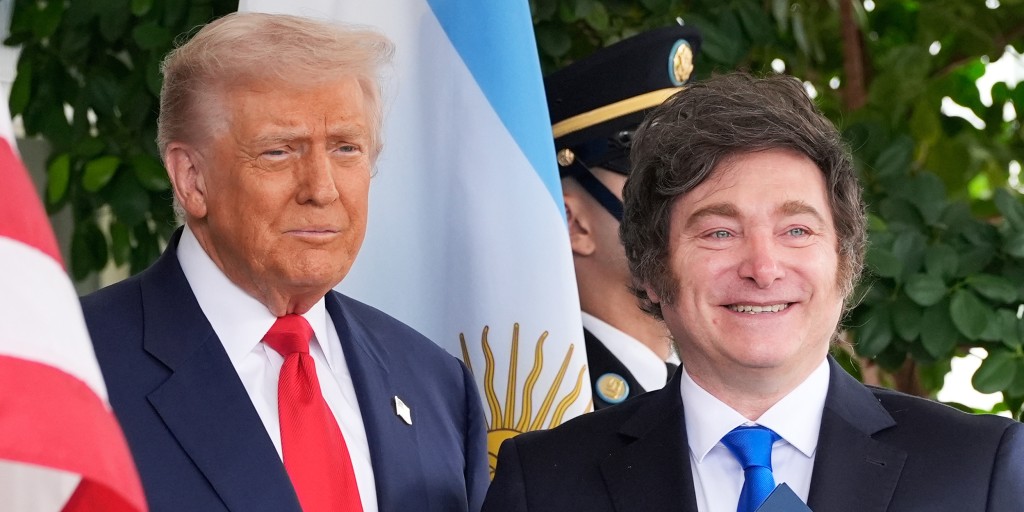Argentina’s far-right President Javier Milei has scored a remarkable victory in Sunday’s midterm elections, winning a plurality of the vote despite years of economic turmoil and recent political controversies surrounding his administration. Analysts have described the result as unexpected, given the country’s ongoing financial crisis and Milei’s declining popularity.
With more than 95% of ballots counted, Milei’s libertarian party, La Libertad Avanza, secured 40.84% of the nationwide vote. The Peronist opposition, Fuerza Patria, garnered 31.67%, maintaining its hold on Congress. While Milei’s victory falls short of a congressional majority, the result is nonetheless significant. It demonstrates a political shift in Argentina’s largest electoral districts, particularly Buenos Aires, home to roughly 40% of the country’s electorate.
“This election marks a tipping point – the construction of a great Argentina begins,” Milei told supporters in Buenos Aires, before a crowd of hundreds at a hotel. Echoing U.S. President Donald Trump’s campaign rhetoric, Milei proclaimed, “Now we are focused on carrying out the reforms that Argentina needs to consolidate growth and the definitive take-off of the country – to make Argentina great again.”
The U.S. role in this election was particularly notable. In the weeks leading up to the vote, President Trump announced a $40 billion bailout for Argentina and explicitly linked continued aid to Milei’s electoral success. Trump subsequently congratulated Milei on Sunday night, calling the win a “landslide victory” and claiming that “our confidence in him was justified by the people of Argentina.”
Trump’s intervention was controversial within Argentina. Some citizens viewed the U.S. support as unwarranted interference in domestic politics, while others welcomed the financial lifeline amid a deepening economic crisis. The bailout, combined with an earlier $20 billion loan from the International Monetary Fund (of which $14 billion had already been disbursed), is aimed at stabilizing Argentina’s currency and shoring up the government’s fiscal position.
Despite these achievements, Milei’s administration has faced a number of significant challenges. He launched office as president nearly two years ago with aggressive “chainsaw” spending cuts, eliminating tens of thousands of public sector jobs and freezing investments in critical sectors including infrastructure, healthcare, education, and pensioner medicine supplies. The measures helped curb hyperinflation, which peaked above 200% in 2023, down to around 30% by September 2025, while Argentina achieved its first fiscal surplus in 14 years. Economic growth resumed modestly in August 2025, rising 0.3% after three consecutive months of contraction.
Yet, the cost to ordinary Argentinians has been steep. Purchasing power has fallen dramatically, unemployment has risen, and more than 18,000 businesses have closed. Milei’s government has burned through its dollar reserves to prevent the peso from collapsing, and the administration’s promotion of a cryptocurrency that later collapsed damaged public confidence further.
The political fallout from Milei’s inner circle has also attracted widespread attention. His sister and key cabinet member, Karina Milei, has been implicated in an alleged corruption scheme, and one of the party’s leading candidates withdrew from the election after admitting to receiving $200,000 from a U.S.-accused drug trafficker. These scandals, coupled with the economic strain, were expected to hurt Milei at the polls. Analysts had projected a result between 30% and 35% as satisfactory, particularly after Milei’s heavy defeat in September’s Buenos Aires provincial elections, where he lost by 14 percentage points to the Peronists.
Yet Milei’s party managed to defy expectations. La Libertad Avanza won 64 seats in the 127-seat lower house up for grabs, and 12 of 24 contested Senate seats. Combined with existing representation, the party now controls at least one-third of the lower house, enough to sustain presidential vetoes. For Milei, this marks a key strategic victory: he may not have a congressional majority, but he now has the leverage to push through some elements of his controversial reform agenda.
Voter turnout, however, was historically low, at 67.85% — the lowest since Argentina’s return to democracy in 1983. Analysts suggest the poor turnout reflects voter disillusionment with both the ruling party and the opposition, as well as skepticism about whether Milei’s promises can realistically be fulfilled given Argentina’s structural economic challenges.
Political commentators in Buenos Aires noted the symbolic nature of Milei’s remarks after the election. “I am the king of a lost world,” he told supporters, a statement reflecting both defiance and ambition. By framing the midterms as a turning point, Milei signaled his intent to use the U.S. bailout and his electoral momentum to push ahead with radical economic reforms, despite domestic skepticism.
For the United States, the outcome represents a complex diplomatic scenario. Trump’s endorsement and financial intervention yielded a political win for a U.S.-aligned leader in South America, but it also risks stoking anti-American sentiment in Argentina, where foreign influence in politics is a sensitive issue. The Biden administration, observing from Washington, will likely weigh carefully how to engage with Milei’s government without appearing to favor one party over another.
As Milei moves forward, his administration faces the dual challenge of translating political victories into sustainable economic reforms while managing public frustration and lingering corruption concerns. The midterm election results, surprising as they were, do not erase the structural challenges Argentina faces, from inflation and unemployment to fiscal instability and foreign debt obligations. How Milei navigates these issues will define not just the next two years of his presidency, but Argentina’s broader trajectory on the global stage.

